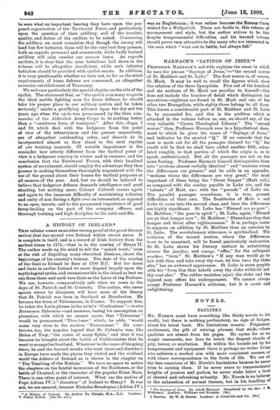A HISTORY OF IRELAND.*
Tars volume comes as another strong proof of the great literary mival that has spread over Ireland within recent years. It is complete in itself, and is a record of Irish history from the earliest times to 1171,—that is, to the coming of Henry II. The author made up his mind to tell the "naked truth," even at the risk of dispelling many cherished illusions, about the beginnings of his country's history. The date of the coming of the Gael to Ireland he fixes at 1700 B.C. But for dates and facts in earlier Ireland we must depend largely upon the mythological cycles, and reconstruct life in the island as best we OM from these and such sure facts as the Laws of the Brehons. We are, however, comparatively safe when we come to the days of St. Patrick and St. Columba. The author, who never spares where he disagrees, will have none of the theory that St. Patrick was born in Scotlaud at Dumbarton. He favours the town of Theronanne, in France. To support him, be takes the Latin phrase in the saint's "Confessions"—inrico Bannauern Taberniae—and assumes, basing his assumption on phonetics, with which we cannot agree, that " Taberniae " would be pronounced " Thor-i-nae," which, be adds, "would come very close to the modern Therouanne.'' He over- throws, too, the popular legend that St. Columba was, like Helen of Troy, "the cause of many fights," and that it was because he brought about the battle of Cuildreimbne that be went to evangelise Scotland. Whatever be the cause of his going there, he and the learned monks who went there and elsewhere in Europe have made the places they visited and the civilised world the debtors of Ireland, as is shown in the chapter on " The Teaching of the Nations." We have no space to notice the chapters on the fateful incursions of the Northmen, or the battle of Clontarf, or the character of the popular Brian Born. There is one other point of interest. What vas the motive of Pope Adrian IV.'s "Donation" of Ireland to Henry ? It was not, we are assured, because Nicholas Breakspear (Adrian IV.) • A History of Ireland. By Arthur Us Clerisa, S.C. London : T. Fisher Unwin. [10s. 43:1. net.] was an Englishman; it was rather becalm the Roman Curia wished for a Welepolitik. There are faults in this volume of arrangement and style, but the author strives to be fair despite temperamental di ffictiltied, and his learned volume should prove 'very attractive to the many who are interested in the race which " went out to battle, but always fell."






































 Previous page
Previous page